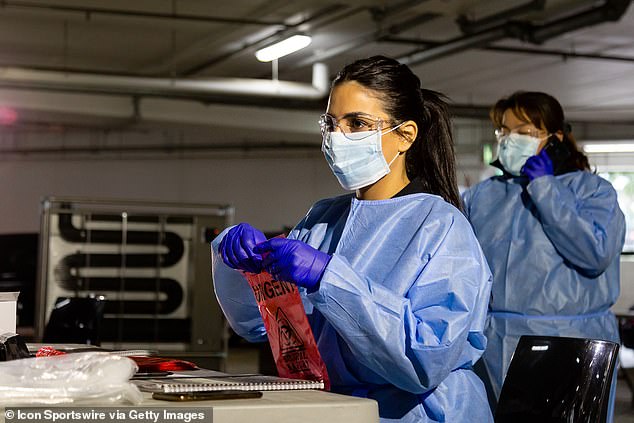Highly contagious infection explodes in one Aussie state with 23 times MORE cases than last year
Queensland has recorded a huge spike in whooping cough, with the number of cases almost 23 times higher than last year.
It comes as Australia faces the largest whooping cough epidemic in history since vaccines against the disease were invented.
Whooping cough is a highly contagious and potentially fatal lung disease that can be life-threatening for babies and young children.
Queensland Health data shows there have been more than 12,500 cases of the disease in 2024, compared to just 549 cases in 2023.
Of the cases this year, 199 resulted in hospitalizations, including 37 infants who were younger than six months old.
That’s a big increase in young babies with whooping cough: in 2023, only 14 babies under the age of six months were admitted to hospital.
Dr. Heidi Carroll, executive director of Queensland Health’s Communicable Diseases unit, told the ABC the disease is extremely dangerous to babies.
‘They cough so badly that they can’t catch their breath. They then can’t get enough oxygen into their systems,” Dr. Carroll said.
Queensland has recorded a huge spike in whooping cough, with the number of cases almost 23 times higher than last year
She thought a drop in vaccination rates could be behind the rise in cases this year.
‘There are many studies underway into why our vaccination rates are declining.’
The data shows that whooping cough vaccination rates are declining among pregnant women, as well as among one- and two-year-old babies in Queensland.
Among pregnant women, the percentage fell from 77.2 percent in 2020 to 70.7 percent in 2023.
But Dr. Carroll said if pregnant women get the vaccine, it will help protect their unborn children.
‘Vaccinating pregnant women reduces the risk of babies developing whooping cough by 75 percent and also reduces the risk of serious illness, thereby avoiding hospital admission.
“They can get that vaccine for free, and they can get it from 20 to 32 weeks of pregnancy.”
The percentages among one- and two-year-olds have also fallen, from 94.4 percent and 93.1 percent respectively in 2018, to 90.8 percent and 89.7 percent in 2024.

Vaccination rates for whooping cough have fallen among pregnant women in Queensland
Australia is currently in the grip of a whooping cough epidemic; More than 41,000 cases have been recorded this year, surpassing the previous record of 38,748 cases in 2011.
National figures show a major spike in cases among school-age children, with almost 40 percent of infections recorded among 10- to 14-year-olds.
Dr. Laurence Luu, Chancellor’s Research Fellow and lecturer at the University of Technology Sydney, said the disease was more contagious than Covid-19.
“Given the significant increase in whooping cough cases, current vaccination rates are of great concern,” Dr Luu said.
“While we are doing a fantastic job protecting newborns and babies, revaccination or ‘booster’ rates are alarmingly low.”
Symptoms of whooping cough do not appear until two weeks after infection, meaning a person can remain contagious for up to three weeks.
It usually starts with typical flu-like symptoms such as coughing, runny nose, watery eyes and low-grade fever.
A dry and persistent cough usually lasts for a week and the frequency of coughing produces a ‘whoop’ sound.
